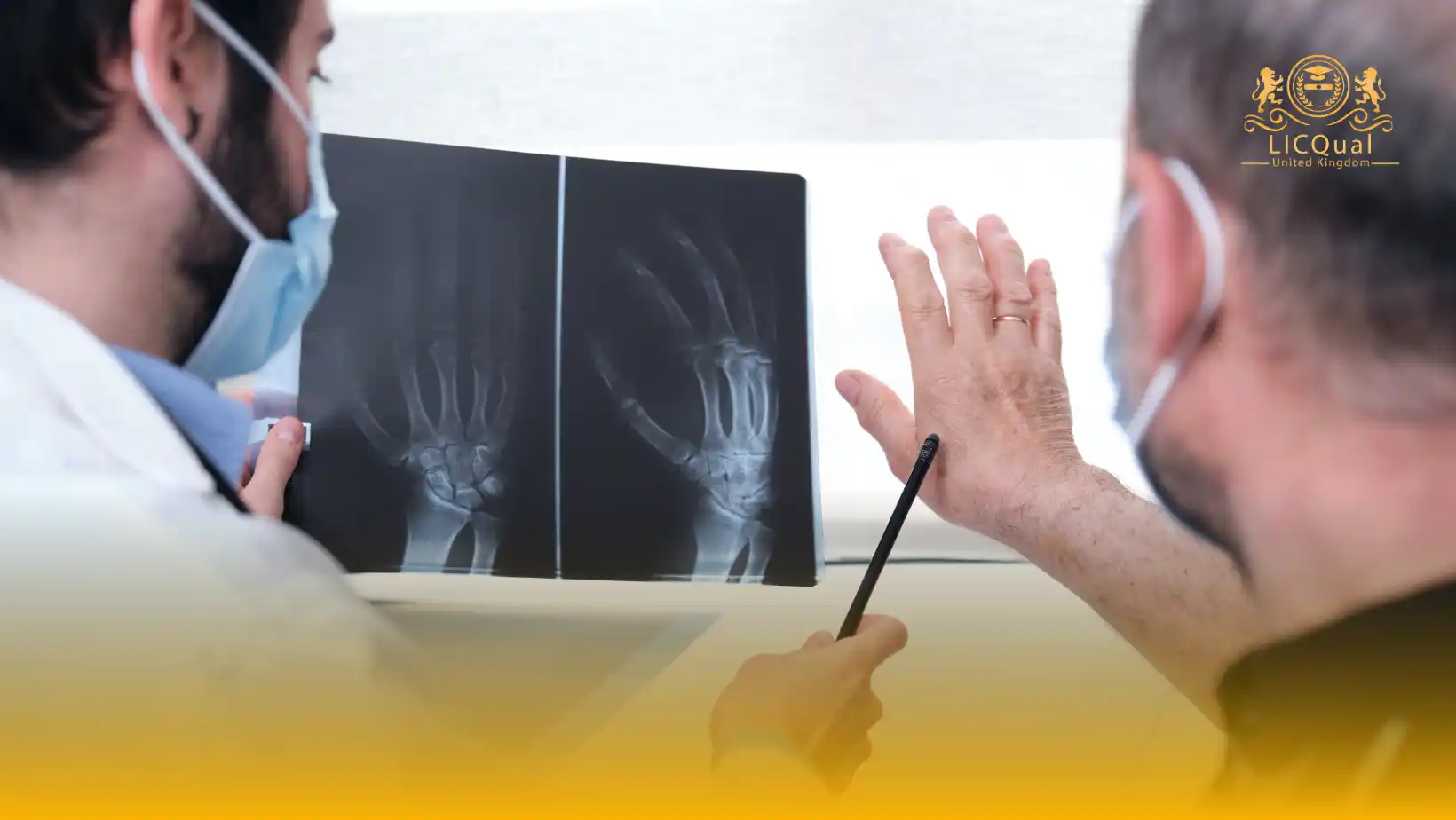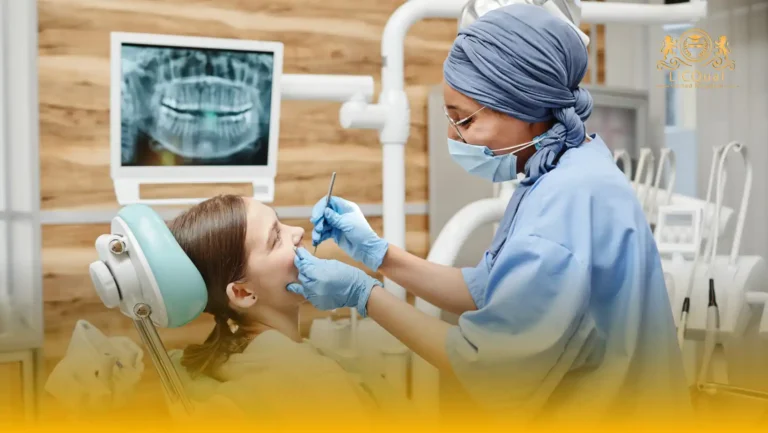The LICQual Level 6 Diploma in Rheumatology (Dip R) is a specialised qualification designed for healthcare professionals seeking to advance their expertise in the diagnosis, management, and treatment of rheumatologic conditions. This diploma is not intended for fresh candidates but is tailored for experienced professionals who wish to enhance their career prospects, deepen their medical knowledge, and strengthen their Continuing Professional Development (CPD).
Rheumatology is a rapidly evolving field that deals with complex autoimmune and musculoskeletal disorders, requiring advanced knowledge and practical skills. This programme equips learners with the ability to critically analyse clinical practices, evaluate evidence-based treatments, and apply advanced diagnostic techniques to improve patient outcomes. By completing this diploma, learners will be prepared to take on senior roles in healthcare, research, and clinical practice while contributing to the advancement of rheumatology.
Centres delivering the LICQual Level 6 Diploma in Rheumatology must ensure that they have qualified and competent staff with extensive expertise in the field, as well as access to up-to-date learning resources, research materials, and modern teaching facilities. This guarantees that learners receive high-quality education, robust training, and the academic support needed to achieve success.
With a strong focus on professional growth and academic excellence, this diploma provides an outstanding opportunity for healthcare professionals to enhance their specialisation in rheumatology and gain an internationally recognised qualification that will elevate their career pathways.
Course Overview
Qualification Title
LICQual Level 6 Diploma in Rheumatology (Dip R)
Total Units
6
Total Credits
120
GLH
480
Qualification #
LICQ2200938
Qualification Specification
To enroll in the LICQual Level 6 Diploma in Rheumatology (Dip R), applicants must meet the following criteria:
|
Qualification# |
Unit Title |
Credits |
GLH |
|---|---|---|---|
|
LICQ2200938-1 |
Principles and Foundations of Rheumatology |
20 |
80 |
|
LICQ2200938-2 |
Musculoskeletal Anatomy, Physiology, and Pathophysiology |
20 |
80 |
|
LICQ2200938-3 |
Clinical Assessment and Diagnosis in Rheumatology |
20 |
80 |
|
LICQ2200938-4 |
Therapeutic Interventions in Rheumatology |
20 |
80 |
|
LICQ2200938-5 |
Advanced Imaging and Laboratory Techniques in Rheumatology |
20 |
80 |
|
LICQ2200938-6 |
Research Methods and Evidence-Based Practice in Rheumatology |
20 |
80 |
By the end of this course, learners will be able to:
Unit 1: Principles and Foundations of Rheumatology
By the end of this unit, learners will be able to:
- Critically evaluate the principles and scope of rheumatology within modern healthcare.
- Analyse ethical, legal, and professional standards in rheumatology practice.
- Demonstrate understanding of global trends, challenges, and innovations in musculoskeletal and autoimmune disorders.
- Apply foundational knowledge to support evidence-based clinical decision-making.
Unit 2: Musculoskeletal Anatomy, Physiology, and Pathophysiology
By the end of this unit, learners will be able to:
- Demonstrate advanced knowledge of the anatomy and physiology of bones, joints, muscles, and connective tissues.
- Critically analyse the pathophysiology of common and complex rheumatologic conditions.
- Assess the systemic effects of musculoskeletal and autoimmune disorders on patient health.
- Integrate anatomical and physiological knowledge into clinical assessment and management strategies.
Unit 3: Clinical Assessment and Diagnosis in Rheumatology
By the end of this unit, learners will be able to:
- Conduct comprehensive patient histories and advanced physical examinations in rheumatology.
- Apply recognised diagnostic criteria for musculoskeletal and autoimmune conditions.
- Critically evaluate clinical findings to formulate accurate diagnoses.
- Develop effective, patient-centred management plans based on assessment outcomes.
Unit 4: Therapeutic Interventions in Rheumatology
By the end of this unit, learners will be able to:
- Critically evaluate pharmacological, non-pharmacological, and lifestyle interventions for rheumatologic conditions.
- Demonstrate understanding of physiotherapy, occupational therapy, and rehabilitation approaches.
- Assess and monitor treatment outcomes to optimise patient care.
- Apply evidence-based strategies to adjust therapeutic plans in clinical practice.
Unit 5: Advanced Imaging and Laboratory Techniques in Rheumatology
By the end of this unit, learners will be able to:
- Demonstrate proficiency in interpreting advanced imaging techniques including X-ray, MRI, ultrasound, and CT scans.
- Analyse laboratory investigations such as inflammatory markers and autoantibody testing.
- Integrate imaging and laboratory data into accurate diagnostic and treatment planning.
- Apply evidence-based clinical reasoning to enhance patient management.
Unit 6: Research Methods and Evidence-Based Practice in Rheumatology
By the end of this unit, learners will be able to:
- Design and implement research projects using appropriate methodologies in rheumatology.
- Critically appraise scientific literature and evaluate research evidence.
- Apply statistical and analytical methods to interpret clinical data effectively.
- Integrate research findings into evidence-based practice to improve patient outcomes.
The LICQual Level 6 Diploma in Rheumatology (Dip R) is designed for healthcare professionals seeking to enhance their expertise in musculoskeletal and autoimmune disorders. This advanced diploma is tailored for experienced practitioners committed to professional development and Continuing Professional Development (CPD).
This course is ideal for:
- Medical Doctors and Rheumatologists – wishing to deepen their knowledge of rheumatologic conditions and advanced clinical management.
- Physiotherapists and Occupational Therapists – aiming to strengthen their understanding of musculoskeletal disorders and improve patient rehabilitation strategies.
- Clinical Scientists and Researchers – who want to integrate evidence-based research into rheumatology practice.
- Nurses and Specialist Healthcare Practitioners – working in rheumatology or musculoskeletal care settings.
- Healthcare Professionals in Diagnostic Services – seeking to develop expertise in laboratory and imaging techniques for rheumatologic assessment.
- Medical Educators and Trainers – aiming to enhance teaching credentials in rheumatology and allied health education.
- Professionals Seeking Career Advancement – looking to pursue senior roles, clinical leadership, or specialised practice within rheumatology.
This diploma equips learners with the knowledge, clinical skills, and research capability required to excel in rheumatology practice, improve patient outcomes, and advance their professional careers.
To deliver the LICQual Level 6 Diploma in Rheumatology, centres must meet rigorous standards to ensure high-quality education, effective learner support, and successful qualification outcomes.
Staffing and Faculty Requirements
- Centres must employ qualified and experienced teaching staff with expertise in rheumatology, musculoskeletal medicine, and allied healthcare fields.
- Trainers and assessors should hold academic and professional qualifications at or above Level 6 and demonstrate current clinical practice.
- Staff should maintain ongoing Continuing Professional Development (CPD) to stay up to date with advances in rheumatology.
Facilities and Learning Resources
- Access to modern classrooms, laboratories, and clinical or simulation facilities to support theoretical and practical learning.
- Availability of up-to-date study materials, research journals, and digital learning platforms.
- Access to imaging equipment, laboratory facilities, and other healthcare resources for hands-on training where applicable.
Quality Assurance and Assessment
- Implementation of robust assessment systems, including practical evaluations, assignments, and case-based studies.
- Regular internal and external quality assurance checks to ensure international standards are consistently met.
- Secure systems for monitoring learner progress, feedback, and certification records.
Learner Support
- Provision of academic guidance, career support, and pastoral care for all learners.
- Access to study resources, case studies, and evidence-based practice materials.
- Commitment to inclusive learning, ensuring equal opportunities and support for all learners.
By meeting these requirements, centres will uphold the integrity, credibility, and global recognition of the LICQual Level 6 Diploma in Rheumatology, providing learners with the advanced knowledge and skills necessary for professional excellence in rheumatology practice.
Assessment and Verification
All units within this qualification are subject to internal assessment by the approved centre and external verification by LICQual. The qualification follows a criterion-referenced assessment approach, ensuring that learners meet all specified learning outcomes.
To achieve a ‘Pass’ in any unit, learners must provide valid, sufficient, and authentic evidence demonstrating their attainment of all learning outcomes and compliance with the prescribed assessment criteria. The Assessor is responsible for evaluating the evidence and determining whether the learner has successfully met the required standards.
Assessors must maintain a clear and comprehensive audit trail, documenting the basis for their assessment decisions to ensure transparency, consistency, and compliance with quality assurance requirements.






